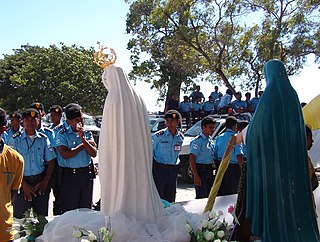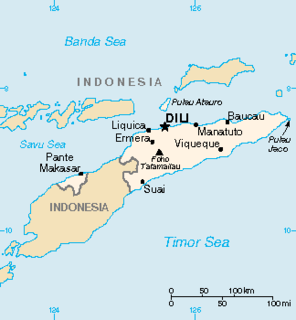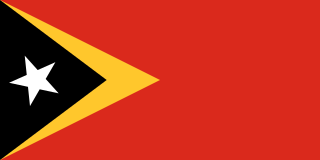Related Research Articles

The United Nations Mission for the Referendum in Western Sahara is the United Nations peacekeeping mission in Western Sahara, established in 1991 under United Nations Security Council Resolution 690 as part of the Settlement Plan, which had paved way for a cease-fire in the conflict between Morocco and the Polisario Front over the contested territory of Western Sahara.

The United Nations Human Rights Council (UNHRC) is a United Nations body whose mission is to promote and protect human rights around the world. The Council has 47 members elected for staggered three-year terms on a regional group basis. The headquarters of the Council are at the United Nations Office at Geneva in Switzerland.

The United Nations Mission of Support to East Timor (UNMISET) lasted from 20 May 2002 to 20 May 2005, when it was replaced by United Nations Office in Timor Leste (UNOTIL). It was established when East Timor became an internationally recognised independent state and the United Nations Transitional Administration in East Timor (UNTAET) came to an end.

The International Force East Timor (INTERFET) was a multinational non-United Nations peacemaking task force, organised and led by Australia in accordance with United Nations resolutions to address the humanitarian and security crisis that took place in East Timor from 1999–2000 until the arrival of UN peacekeepers. INTERFET was commanded by an Australian military officer, Major General Peter Cosgrove.
The UNTAET Crime Scene Detachment was the common title for an elite investigative unit created in the war-torn and newly liberated country of East Timor in November 1999, under the direction of the United Nations Transitional Administration in East Timor, consisting of International Police, Australian military police and New Zealand military police. The unit was tasked with performing the exhumations of several hundred East Timorese homicide victims killed during the UN mandate for the East Timor mission. The unit became best known for its investigations and exhumations relating to both the Liquiçá Church Massacre and the Manuel Carrascalão House Massacre.

The 2006 East Timorese crisis began as a conflict between elements of the military of East Timor over discrimination within the military and expanded to a coup attempt and general violence throughout the country, centred in the capital Dili. The crisis prompted a military intervention by several other countries and led to the resignation of Prime Minister Mari Alkatiri.

The United Nations Integrated Mission in East Timor (UNMIT) was established on 25 August 2006 by UN Security Council Resolution 1704. Its objectives are "to support the Government in consolidating stability, enhancing a culture of democratic governance, and facilitating political dialogue among Timorese stakeholders, in their efforts to bring about a process of national reconciliation and to foster social cohesion". In its most recent resolution on UNMIT, the Council extended its mandate until 26 February 2012. UNMIT and ISF troops left the country at the end of 2012.

The 2003 invasion of Iraq by the United States, United Kingdom, Australia, Poland and a coalition of other countries was a violation of the United Nations Charter, the bedrock of international relations in the post-World War II world. The then United Nations Secretary-General Kofi Annan stated in September 2004 that: "I have indicated it was not in conformity with the UN charter. From our point of view and the UN Charter point of view, it [the war] was illegal".
The Special Panels for Serious Crimes was the hybrid international–East Timorese tribunal that was created in 2000 by the United Nations Transitional Administration in East Timor (UNTAET) to try cases of "serious criminal offences" which took place in East Timor in 1999. The Special Panels sat from 2000 to 2006.

The 1999 East Timorese crisis began with attacks by pro-Indonesia militia groups on civilians, and expanded to general violence throughout the country, centred in the capital Dili. The violence intensified after a majority of eligible East Timorese voters chose independence from Indonesia. Some 1,400 civilians are believed to have died. A UN-authorized force (INTERFET) consisting mainly of Australian Defence Force personnel was deployed to East Timor to establish and maintain peace.

United Nations Security Council resolution 1262, adopted unanimously on 27 August 1999, after recalling previous resolutions on East Timor, particularly resolutions 1246 (1999) and 1257 (1999), the Council extended the mandate of the United Nations Mission in East Timor (UNAMET) until 30 November 1999.

United Nations Security Council resolution 1338, adopted unanimously on 31 January 2001, after recalling previous resolutions on East Timor (Timor-Leste), particularly resolutions 1272 (1999) and 1319 (2000), the Council extended the mandate of the United Nations Transitional Administration in East Timor (UNTAET) for a year until 31 January 2002.

United Nations Security Council resolution 1392, adopted unanimously on 31 January 2002, after recalling previous resolutions on East Timor (Timor-Leste), particularly resolutions 1272 (1999) and 1338 (2001), the Council extended the mandate of the United Nations Transitional Administration in East Timor (UNTAET) until 20 May 2002.

United Nations Security Council resolution 1410, adopted unanimously on 17 May 2002, after recalling previous resolutions on East Timor (Timor-Leste), particularly resolutions 1272 (1999), 1338 (2001) and 1392 (2002), the council established the United Nations Mission of Support to East Timor (UNMISET) to replace the United Nations Transitional Administration in East Timor (UNTAET).

China-East Timor relations were established following East Timor's independence on May 20, 2002. However, China had established a representative office in Dili in 2000, when was still under United Nations administration.

United Nations Security Council resolution 1543 was adopted unanimously on 14 May 2004, after reaffirming previous resolutions on East Timor (Timor-Leste), particularly resolutions 1410 (2002), 1473 (2003) and 1480 (2003). The Council extended the mandate of the United Nations Mission of Support to East Timor (UNMISET) for six months, with a view to extending it for a further final period of six months until 20 May 2005.

United Nations Security Council resolution 1599, adopted unanimously on 28 April 2005, after reaffirming previous resolutions on East Timor (Timor-Leste), particularly resolutions 1543 (2004) and 1573 (2004), the council established the United Nations Office in Timor-Leste (UNOTIL) to follow on from the United Nations Mission of Support to East Timor (UNMISET) as a special political mission for one year until 20 May 2006.

East Timor is a multiparty parliamentary republic with a population of approximately 1.1 million, sharing the island of Timor with Indonesia's Nusa Tenggara province. During the 24 years of Indonesian occupation and after the 1999 independence referendum, pro Indonesian militias committed many human rights violations. The country gained independence in 2002, and free and fair elections were held in 2007. The United Nations Integrated Mission in East Timor (UNMIT) and the International Stabilization Force remain in the country while it develops its own security forces, the National Police (PNTL) and Defence Forces (F-FDTL).

The Indonesia–Timor Leste Commission on Truth and Friendship was a truth commission established jointly by the governments of Indonesia and East Timor in August 2005. The commission was officially created to investigate acts of violence that occurred around the independence referendum held in East Timor in 1999 and sought to find the "conclusive truth" behind the events. After holding private hearings and document reviews, the commission handed in the final report on July 15, 2008 to the presidents of both nations, and was fully endorsed by Indonesian President Susilo Bambang Yudhoyono, providing the first acknowledgement by the government of Indonesia of the human rights violations committed by state institutions in Timor. The commission is notable for being the first modern truth commission to be bilateral.

United Nations Administered East Timor refers to the period between 25 October 1999 and 20 May 2002 when East Timor was administered by the United Nations Transitional Administration in East Timor as a United Nations protectorate.
References
- ↑ United Nations Security Council Resolution S/RES/1410(2002) page 2. (2002) Retrieved 2007-09-05.
- ↑ United Nations Security Council Document S/2002/1223 page 5. 6 November 2002. Retrieved 2007-09-05.
- ↑ United Nations Security Council Resolution S/RES/1599(2005) page 3. 28 April 2005. Retrieved 2007-09-05.
- ↑ Mark Dodd (1 May 2001). "Massacres Go Unpunished As UN Crimes Unit Heads For Collapse". Sydney Morning Herald. Archived from the original on 15 May 2003. Retrieved 5 September 2007.
- ↑ "East Timor hit by fresh looting". BBC News. 30 May 2006. Retrieved 2007-09-05.
- ↑ Anne Barker (31 May 2006). "Serious Crimes Unit office looted in Dili". ABC Online. Retrieved 2007-09-04.